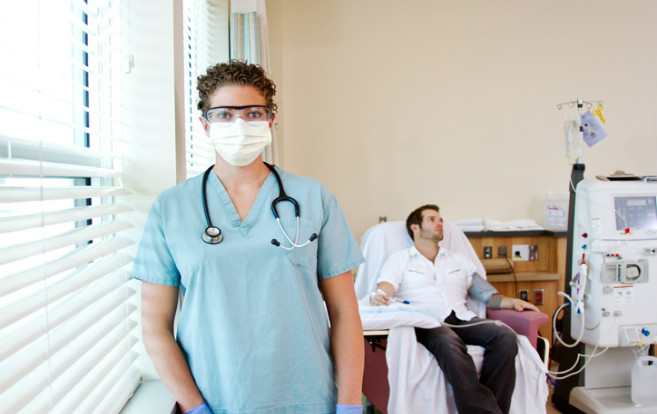Rise in Chronic Kidney Disease Driving Demand for Dialysis Nurses

By Megan Murdock Krischke, contributor
More than half of Americans over the age of 30 are at risk of developing chronic kidney disease (CKD) during their lifetime, according to a new study published in the March issue of American Journal of Kidney Diseases. One of the driving factors in the rate of CKD is this country’s obesity epidemic, and experts expect the disease to drive higher demand for nephrology nursing professionals, including dialysis nurse jobs.
Excess body weight increases an individual’s likelihood of developing hypertension and type 2 diabetes, which are the leading causes of CKD in adults, explained Cindy Richards, BSN, RN, CNN, president-elect of the American Nephrology Nurses Association (ANNA).
Chronic kidney disease can describe a variety of conditions that negatively impact kidney function over time. CKD can progress to kidney failure (also known as end-stage renal disease, or ESRD) and require the patient to receive either ongoing dialysis or a kidney transplant.
The statistics on chronic kidney disease
Adults aged 30-49, without chronic kidney disease at baseline, have the highest risk (54 percent) of developing CKD in their lifetimes, according to the new study. Those aged 50-64 are at 52 percent risk, while those over the age of 65 have a 42 percent chance of developing CKD.
Additional facts about chronic kidney disease from the Centers for Disease Control and Prevention (CDC):
• Women are more likely than men to develop CKD;
• More than 20 million Americans--or 1 out of every 10 adults--is estimated to currently have CKD in varying degrees of severity;
• An additional 70 million Americans are at risk for CKD because they have diabetes or hypertension;
• In 2011, more than 113,000 Americans started treatment for end-stage renal disease (ESRD).
The impact on nephrology nursing
“The continued increase of people with CKD will also affect the numbers of medical personnel needed to provide care for them,” remarked Richards. “There will be an increased need for nephrology nurses to provide care in the physician’s office, in the hospitals, and especially in the dialysis units. Most dialysis units have technicians, LPNs/ LVNs and RNs who provide care to the patients in those units. There will also be an increased need for advanced practice registered nurses [(APRNs)] to provide care in the office, in the hospital and in the dialysis unit, as the number of nephrologists is decreasing and the number of patients is increasing.”
“The medical community can prepare for this increased need by encouraging more students to pursue nursing as a career,” she continued. “The American Nephrology Nurses Association offers a discounted membership to student nurses in order to get them interested in pursuing the field of nephrology once they graduate nursing school and begin their nursing career. ANNA also offers a number of resources to provide additional knowledge and education to nurses to assist them in the care of the CKD patients.”
An abundance of dialysis nurse jobs for travel RNs
Current disease levels seem to already be affecting the need for nurses who can treat this population. For instance, dialysis travel nurses are in high demand, reports Kylie Stein, recruiter for American Mobile Healthcare, an AMN Healthcare company.
“There is a huge, huge demand all over the country,” said Stein, who noted that there are currently more dialysis nurse jobs than there are candidates to fill them and travelers are in a good position to negotiate for shifts. “We have openings in acute care, in dialysis clinics, in adult, pediatric, peritoneal and hemodialysis.”
“We can keep dialysis nurses working,” she continued, adding that qualified candidates can usually go where they want. “And if a traveler particularly likes a location or a facility, it is generally easy to extend a contact.”
CKD preventive measures
The researchers for the American Journal of Kidney Diseases study suggest that Americans need to be made aware of the high incidence of kidney disease and that interventions to prevent or slow the onset of CKD need to be developed.
While nephrology nursing professionals can help patients who have been diagnosed with the disease, Richards said that individuals can take a number of steps to reduce their own risk, such as:
• Keep blood pressure or diabetes under control;
• Get regular medical checkups;
• Know family medical history, especially in regards to diabetes, hypertension, or kidney disease; these diseases tend to run in families, and those with a family history should be more diligent about regular medical care.
• Exercise regularly;
• Eat a healthier diet, reducing intake of salt, sugar and red meat, and increasing intake of fruits, vegetables and whole grains.
• Lose excess weight and keep body mass index (BMI) below 25 percent;
• Avoid the use of non-steroidal anti-inflammatory drugs (NSAIDs) like ibuprofen, which can decrease the normal blood flow to the kidneys, lead to damage of the tissue of the kidney and cause long-term health problems.
“Caring for CKD patients is a rewarding career,” reflected Richards. “By providing care for those with chronic illnesses, nurses can help improve their quality of life and have a marked effect on the health of the patients. We provide not only hands-on nursing care, but long-term education and support to help enhance, and hopefully lengthen, their lives.”
Looking for dialysis nurse jobs or other nursing opportunities with travel benefits? Advance your career with excellent pay in thousands of locations; apply now to travel!
© 2015. AMN Healthcare, Inc. All Rights Reserved.